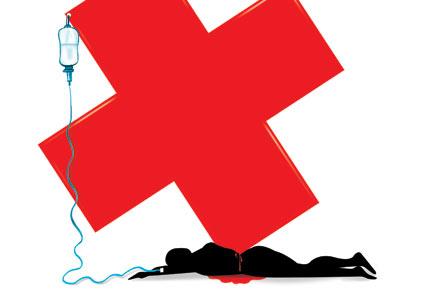It seems fitting that Christmas is jostling for presence with the newly-devised Good Governance Day. I don’t make this remark in the light of the (rather improverished) debate on communalism

Opinion, Columnists, Paromita Vohra, Christmas, Good Governance Day, KEM Hospital
 It seems fitting that Christmas is jostling for presence with the newly-devised Good Governance Day. I don’t make this remark in the light of the (rather improverished) debate on communalism. Rather, I’m thinking of the set of values any society chooses to cherish as the cornerstone of its development and growth.
It seems fitting that Christmas is jostling for presence with the newly-devised Good Governance Day. I don’t make this remark in the light of the (rather improverished) debate on communalism. Rather, I’m thinking of the set of values any society chooses to cherish as the cornerstone of its development and growth.
ADVERTISEMENT
Christmas, like most major festivals, calls up values of renewal and hope, love and sharing, encompassing all humanity. What ideas does Good Governance call up? Like a cut-price advertisement slogan, saying its isotonic salts will quench thirst forever and remove all stains, it sounds good, but, er, means what?
India spends about one per cent of its GDP on health, among the lowest in the world. Now the health ministry has slashed the ongoing health budget by 20 per cent cut or R6,000 crore citing fiscal strain. There must be fiscal strain, but should we cut first what we spend lowest on, especially given that for the majority of, by no means insubstantial, poor and lower middle-class, public hospitals are the only option? It’s puzzling.
Once Mumbai’s JJ Hospital and KEM Hospital were among the country’s best. But over time the municipality and the government, have hollowed out the public health system in a manner that can only be described as a cruelty to its own people, a kind of low-grade systemic killing of poor citizens. It’s not that private hospitals shouldn’t be made. But many are built on public land and avail public subsidy in return for a quota of poor patients, a quota they never fulfill, nor does anyone make them. Meanwhile public hospitals struggle under too much burden, too few resources and hardly any vision.

Illustration / Amit Bandre
These things were all too clear in a wonderful documentary I watched last week. Gulserene Dastur’s ‘Getting Better: Stories from KEM Hospital’ is one of the most humane films I’ve seen in a long time, a truly made-in-India documentary in the way it told stories of people in a simple, warm-hearted way with gentle humour, with compassion, instead of the artificially ‘exciting’ ‘just like fiction’ narrative au courant in certain ‘global’ documentary; films, which like the government, seem to look at their own people from some distance. This film concealed none of the unpleasant realities of a collapsing public hospital — dirt, unnecessary death, red-tape. But it also left me utterly moved by how wonderful people can be, how inherently kind, committed to their work, and to excellence. We saw doctors and administration, cleaning and cooking staff exceed their brief, work around the system whether to build hostel blocks, get a kid with urinary problems back in school, or fabricate a chapatti machine. We saw families who had lost loved ones struggle with their own grief and yet not fall into easy blame and castigation, recognising the problems of the system. There were teachers who had eschewed lucrative private practice. Only creating good doctors made them feel really happy.
I think now of stories I read too last week — of citizens adopting 7,000 patients with drug-resistant TB in response to a newspaper report. Of the man who owns a cleaning company and whose father was treated at KEM, volunteering his staff for a month to clean this hospital. Of individuals who lost loved ones to a disease donating their life's savings to KEM’s poor box fund.
Then I think of the Santa hats being sold in the stationary wala and kirana shops of my marvellously downmarket neighbouhood, more each year. And I think, like Christmas, we may yet find a way to survive good governance.
Paromita Vohra is an award-winning Mumbai-based filmmaker, writer and curator working with fiction and non-fiction. Reach her at www.parodevi.com.
The views expressed in this column are the individual’s and don’t represent those of the paper.
 Subscribe today by clicking the link and stay updated with the latest news!" Click here!
Subscribe today by clicking the link and stay updated with the latest news!" Click here!






